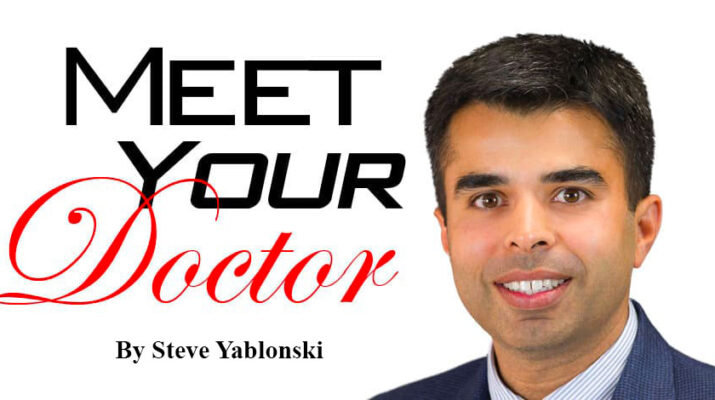Doctor with Hematology-Oncology Associates of CNY specializes in the treatment of gastrointestinal, colon, pancreatic cancers. “There has been a lot of exciting treatment options,” he says about new cancer treatments.
By Steve Yablonski

Q: What is your hometown?
A: Jacobabad, a city in Sindh, Pakistan.
Q: Why did you decide to become a physician?
A: At a very early age, whenever I went to see my family physician for a fever or any other illness, I saw his dedication and how other patients loved him. I felt it would be a very noble profession to help take care of patients at difficult times of their lives and make them feel better. So, I also decided to become a physician.
Q: Where did you get your training?
A: I did my medical school in Pakistan and after completing medical school, I decided to move to the United States in 2004, for further education and training. After three years of internal medicine residency, I joined Dartmouth Hitchcock in New Hampshire as an attending physician for inpatient care.
Q: Where else have you studied?
A: I went to the University of Vermont for a post-doctoral research fellowship in hematology and oncology. There I participated in various research projects in gastrointestinal cancers and symptom management. For my fellowship in hematology and oncology, I joined the University of Rochester Medical Center. I feel fortunate to have learned from some of the best mentors in the field.
Q: Why did you enter the field of hematology/oncology?
A: During my hospitalist physician years, I developed a love for hematology-oncology. The science behind each disease and discovery of new treatment options captured my attention. Despite passing through difficult times, I witnessed the strength of my patients. There was always a true connection between the patient and the oncologist.
Q: What is the most common type of cancer you see?
A: I see all types of cancer and blood disorders. I have particular interest in gastrointestinal cancer, colon cancer, pancreatic cancer, stomach cancers. Things like that.
Q: How did you come to be a part of Hematology-Oncology Associates of CNY?
A: I joined Hematology-Oncology Associates of CNY because I saw a team-based approach utilizing the best available medicine and advanced technology to provide the highest quality of care. I think what makes us unique is the ability to treat the whole patient and develop individualized treatment plans. I treat patients with cancers and blood disorders. I have been here four years now. We have three locations.
Q: Cancer treatments are constantly evolving. Has there been any recent medical breakthrough that may be good news for cancer patients?
A: There has been a lot of exciting treatment options. More options have become available over the last 10 years, which has significantly changed the way we treat the patient, today, 2021. There are a lot of offices, which is a good thing; patients have a lot of options and can choose where they go to get the best care for themselves. The incidences of cancer are increasing and I think we need more providers in our Syracuse area to take care of all the patients.
Q: In what way did the pandemic most affect your work and your patients? Did you notice many patients putting off treatment or cancer screenings?
A: We were open, but patients were cautious due to the pandemic. They were afraid of going out and becoming infected. We started seeing some patients virtually. Now, they are starting to come back to our office.
Q: How do you handle patients asking what their life expectancy is?
A: Obviously, it is a delicate question and no one really knows those answers. Based on their stage and any other underlying medical problem … we can give them an approximate idea of how long the patients usually live. But, everybody’s different. It is also how they respond to their treatments.
Q: I understand you work with a nurse navigator regarding gastrointestinal cancer. Can you tell me more about that? How does that benefit your patients and your practice?
A: Oncology nurse navigators offer individualized assistance to our patients throughout the cancer care continuum, prevention, screening, diagnosis, treatment, survivorship and end of life. They are also very helpful bridging the communication between patient and doctor; there is a lot going on with a patient with a diagnosis of cancer. The navigator makes sure the patient is kept informed about things, even if the doctor isn’t available.
Q: How often do you see a patient?
A: It depends on the patient, once a week, once every two weeks. Every different cancer, every different patient receives different care; depending on their symptoms, the type of treatment they are receiving, they need to be seen at different intervals. We monitor them all to ensure they are receiving treatment in a safe and effective manner.
Q: How important is early detection of cancer?
A: Early detection is very important in all of the cancers. Treatment depends on the stage at diagnosis. So if a cancer is found at an early stage it is much more treatable. But if a patient is diagnosised with an advanced stage, there are treatment options, but they may not be as successful. We have seen some patients with advanced cancers now because they didn’t come for a checkup during the pandemic.
Q: You’re in a stressful line of work. What do you do to relax?
A: During my time away from work, I spend time with my family, visit parks and enjoy food at different restaurants. I enjoy trying different foods; my favorite is Italian.
Lifelines
Name: Santosh Kumar, MD
Position: Medical oncologist at Hematology-Oncology Associates of CNY, which has offices in Auburn, East Syracuse and Onondaga Hill (Syracuse)
Hometown: Jacobabad, Pakistan
Education: Board-certified in internal medicine, medical oncology and hematology
Affiliations: Crouse Hospital, St. Joseph’s Hospital, Auburn Community Hospital
Family: Married, with two children
Hobbies: Spending time with family, visiting parks and enjoying meals at different restaurants

